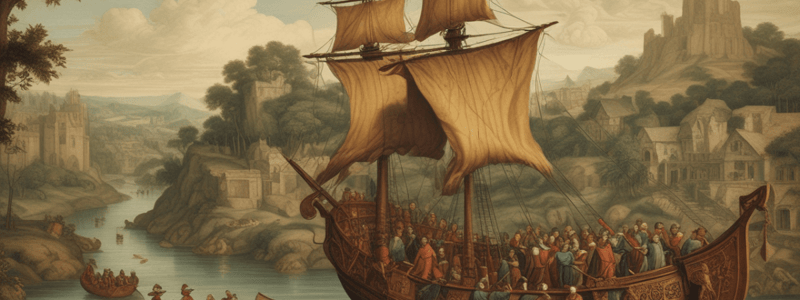Podcast
Questions and Answers
According to Luther, the church should change to help people intellectually.
According to Luther, the church should change to help people intellectually.
False (B)
Luther's main concern was to get the music right in the German mass.
Luther's main concern was to get the music right in the German mass.
True (A)
The 16th century was a time of social stability in Europe.
The 16th century was a time of social stability in Europe.
False (B)
The church was a place of uncertainty and instability during the Reformation.
The church was a place of uncertainty and instability during the Reformation.
Robert Wilkin is a leading Protestant historian.
Robert Wilkin is a leading Protestant historian.
Most people welcomed the Reformation with open arms.
Most people welcomed the Reformation with open arms.
Luther was concerned about disturbing ordinary people through too little change.
Luther was concerned about disturbing ordinary people through too little change.
The Reformation brought certainty and stability to Europe.
The Reformation brought certainty and stability to Europe.
According to Luther, the Pope and the councils are the only authorities that can get it right.
According to Luther, the Pope and the councils are the only authorities that can get it right.
The Leipzig Disputation is more important than the Heidelberg Disputation in clarifying Luther's thinking.
The Leipzig Disputation is more important than the Heidelberg Disputation in clarifying Luther's thinking.
Luther separated from the church voluntarily.
Luther separated from the church voluntarily.
The Protestants did not engage in efforts at ecumenism after the Protestant Reformation.
The Protestants did not engage in efforts at ecumenism after the Protestant Reformation.
Luther's writings of 1520 do not show genuine hope for preserving the unity of the church.
Luther's writings of 1520 do not show genuine hope for preserving the unity of the church.
Thomas Münzer played a significant role in the Protestant Reformation.
Thomas Münzer played a significant role in the Protestant Reformation.
Cardinal Manning wrote a book in the 19th century stating the Antichrist would not be a pope.
Cardinal Manning wrote a book in the 19th century stating the Antichrist would not be a pope.
The Protestant Reformation did not have a significant impact on European history.
The Protestant Reformation did not have a significant impact on European history.
Luther's view of justification was the main reason for his condemnation in 1520.
Luther's view of justification was the main reason for his condemnation in 1520.
The Leipzig Disputation was a significant event in the Reformation, but its impact was not immediately clear to Luther.
The Leipzig Disputation was a significant event in the Reformation, but its impact was not immediately clear to Luther.
Zwingli's teachings were not influential in the Swiss Reformation.
Zwingli's teachings were not influential in the Swiss Reformation.
Luther's theology of humility was fully developed by 1519.
Luther's theology of humility was fully developed by 1519.
Luther's objections to indulgences were not related to a questioning of papal authority.
Luther's objections to indulgences were not related to a questioning of papal authority.
The Reformation was a debate about authority from the outset.
The Reformation was a debate about authority from the outset.
Cardinal Manning was an Anglican churchman who did not convert to Catholicism.
Cardinal Manning was an Anglican churchman who did not convert to Catholicism.
Luther's main concern was to reform the Catholic Church, not to challenge its authority.
Luther's main concern was to reform the Catholic Church, not to challenge its authority.
Cyril Lucaris, the Metropolitan of Constantinople, wrote a Catholic confession of faith.
Cyril Lucaris, the Metropolitan of Constantinople, wrote a Catholic confession of faith.
Luther believed that Jesus was not going to return soon.
Luther believed that Jesus was not going to return soon.
The Roman Catholic Church was the dominant church in the West during Luther's time.
The Roman Catholic Church was the dominant church in the West during Luther's time.
Luther's theological constructions reached a peak in 1525.
Luther's theological constructions reached a peak in 1525.
Luther's career continued to rise throughout his life.
Luther's career continued to rise throughout his life.
Luther was a man of the Renaissance period.
Luther was a man of the Renaissance period.
The Eastern Orthodox Church was a dominant force in Western Europe during the Reformation.
The Eastern Orthodox Church was a dominant force in Western Europe during the Reformation.
Enoch Powell was a 16th-century theologian.
Enoch Powell was a 16th-century theologian.
Luther's main concern was to reform the Catholic Church, not to challenge its authority.
Luther's main concern was to reform the Catholic Church, not to challenge its authority.
Protestants and Catholics did not engage in ecumenical attempts at reunion.
Protestants and Catholics did not engage in ecumenical attempts at reunion.
Luther voluntarily separated from the church.
Luther voluntarily separated from the church.
The Leipzig Disputation was a minor event in the Reformation.
The Leipzig Disputation was a minor event in the Reformation.
Thomas Münzer played a significant role in the Protestant Reformation.
Thomas Münzer played a significant role in the Protestant Reformation.
Zwingli's teachings were influential in the Swiss Reformation.
Zwingli's teachings were influential in the Swiss Reformation.
The Protestant Reformation had little impact on European history.
The Protestant Reformation had little impact on European history.
Eastern Orthodoxy was a significant influence on Luther's thinking.
Eastern Orthodoxy was a significant influence on Luther's thinking.
Flashcards are hidden until you start studying
Study Notes
The Reformation and Luther's Concerns
- Luther wants to get the music right in the German mass, which means he wants to use German music.
- He also doesn't want to disturb people, as he knows that change can be unsettling.
The 16th Century and the Church
- The 16th century is a time of remarkable social transformations, with the rise of cities and the decline of rural populations.
- The world is being transformed by trade and commerce, leading to uncertainty and instability.
- The church is one of the few places where people can find certainty and stability.
The Reformation and Ordinary People
- Most people like the church because it provides a sense of comfort and familiarity, similar to watching childhood TV shows.
- Luther is concerned about disturbing ordinary people through too much change, as they want things to remain the same.
Luther's Theology and the Heidelberg Disputation
- The Heidelberg Disputation is important for clarifying Luther's thinking and bringing out the issue of authority in a crisis manner.
- Luther's concern about authority is a powerful argument, as he questions whether the Pope and councils get it right.
The Leipzig Disputation and Luther's Thinking
- At the Leipzig Disputation, Luther's thinking on authority becomes more explicit, and he begins to question whether he is the only one who got it right.
- Luther doesn't think of separating from the church, but rather wants to reform it from within.
Luther's Career and the Reformation
- Luther's career is similar to that of a politician, where he rises to prominence and then begins to decline.
- From 1525 onwards, Luther's career will peak and then start to degenerate, but he remains the top man in Lutheranism.
- Luther is a man of the medieval period, and he thinks that Jesus is about to return, which is reflected in his imminent eschatological expectation.
The Issue of Authority
- The issue of authority is central to the Reformation, and Luther's view of authority gets him condemned in 1520.
- Luther's questioning of authority begins with his criticism of indulgences, which calls into question the interpretation and application of papal bulls.
The Theology of Humility and Faith
- Luther's development of a theology of humility and later his theology of faith is a gradual process.
- In 1519, Luther is in transition, still developing his theology of humility, but not yet at justification by grace through faith.
Ecumenical Attempts and the Council of Trent
- Protestants and Catholics continue to engage in ecumenical attempts at reunion until the Council of Trent.
- The Council of Trent marks a watershed, where the issue of justification is dealt with, and the Protestants are invited but arrive late.
Luther's View of the Church
- Luther redefines the church as that body in which the Holy Spirit dwells, rather than deriving its power from Rome.
- He does not think of separating from the church, but rather wants to reform it from within.
- In his write-up of the Leipzig Disputation, Luther redefines the church, which Eck, a sharp and clever fellow, sees immediately and makes connections back in history.
Studying That Suits You
Use AI to generate personalized quizzes and flashcards to suit your learning preferences.




